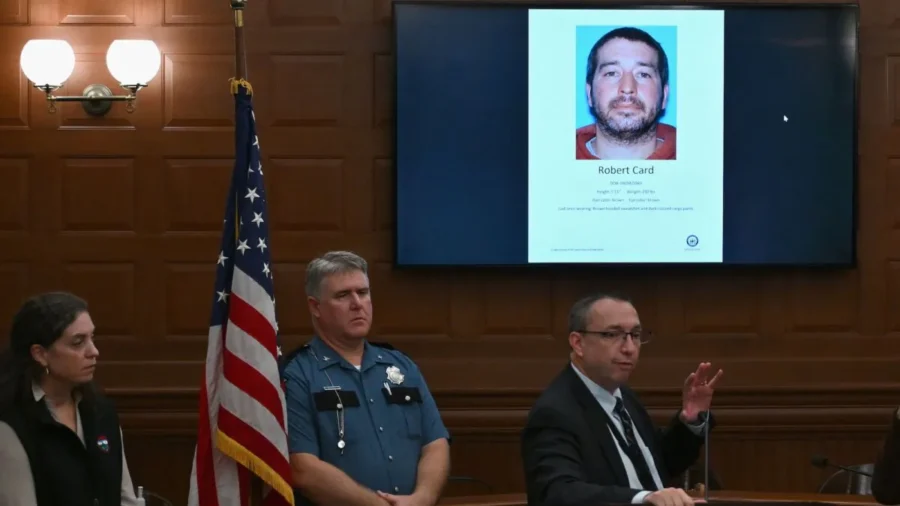Two senators from Maine have called on the Inspector General of the U.S. Department of the Army, Lieutenant General Donna W. Martin to conduct a comprehensive review as to what, if anything, the service could have done to prevent the Oct. 25 shooting spree by a mentally ill reservist.
In a Monday letter, Sen. Susan Collins (R-Maine) and Sen. Angus King (I-Maine) called for an inspector general review while noting reports that the primary suspect in the Lewiston shooting, Robert Card, had exhibited a variety of warning signs known to the service and local law enforcement in the weeks and months leading up to the shooting.
“The killer, Robert Card, was a Sergeant First Class in the U.S. Army Reserve, and press reports corroborated by the Army indicate that he exhibited troubling behaviors prior to the October 25 tragedy,” the two Maine senators wrote.
“Mr. Card exhibited these behaviors over a period of months, including while training with his Army Reserve unit at Camp Smith in New York. Indeed, Mr. Card was evaluated by Army health care clinicians who determined that he needed treatment, and Army personnel were aware that he had threatened to ‘shoot up’ the Army facility located in Saco, Maine. Moreover, the Army ‘directed that while on military duty he should not have a weapon, handle ammunition or participate in live-fire activity.'”
Mr. Card allegedly murdered 18 people in the mass shooting on Oct. 25 and wounded 13 more. He went missing after the attack. Law enforcement searched for two days before locating his body near Lisbon. A medical examiner’s report indicates Mr. Card likely died of a self-inflicted gunshot wound 8-12 hours before he was found.
Crisis Intervention Laws
The Maine senators noted that crisis intervention laws in New York and Maine might have allowed authorities to temporarily block Mr. Card’s access to privately owned firearms.
Maine Gov. Janet Mills has already announced the formation of an independent task force to investigate the role that Maine authorities played in the months leading up to the shooting and their response to it. Ms. Collins and Mr. King said it’s also important to determine what actions might have occurred “or failed to occur” at the federal level that played a role in failing to prevent this mass shooting.
Mr. Card’s own family members had reached out to local law enforcement officials with concerns about his mental health status. On May 3, Mr. Card’s family members contacted the Sagadahoc County Sheriff’s Office, sharing their concerns about his mental state and notifying authorities that he had recently retrieved between 10 and 15 firearms from his brother.
Sheriff Joel Merry said his office conveyed those concerns to Mr. Card’s Army Reserve unit and said officials “assured our office they would ensure that Card received medical attention.”
Mr. Card’s behavior continued to trouble his Army Reserve unit in the months after this May 3 report.
In one July 15 episode, Mr. Card accused his fellow reservists of disparaging him behind his back and locked himself in a hotel room. Responding New York State Police took Mr. Card to a hospital for a medical evaluation and he subsequently spent 14 days in a psychiatric facility. Upon his release, the Army ordered that he not have access to firearms while on duty.
Wellness Checks
The Sagadahoc County Sheriff’s Office was called to Mr. Card’s home for a wellness check on Sept. 15, when he reportedly threatened to attack an Army facility in Saco. Mr. Card was not at home the first time deputies were dispatched to conduct the wellness check. Deputies returned the following day and found Mr. Card’s vehicle was at his residence but that he did not answer the door when they attempted to contact him. Deputies did not continue to pursue that wellness check.
According to Mr. Merry, Mr. Card’s unit commander subsequently told deputies that Mr. Card no longer had access to weapons through the Army, that officials were trying to get Mr. Card treatment, and that he believed it was best to just let Mr. Card be.
Throughout September and October, Mr. Card failed to report for weekend reserve duty, telling the Army he had other work conflicts.
Though the Army restricted his access to firearms on duty, efforts to block his access to privately owned firearms were not as consistent. Last week, the FBI told USA Today that its National Threat Operations Center never received complaints about Mr. Card and the National Instant Criminal Background Check System (NICS) operated by the FBI did not possess any information that would have prohibited Mr. Card from completing a lawful firearm purchase.
Ms. Collins and Mr. King specifically asked the Army’s inspector general service to corroborate what concerns were raised by or with Army personnel pertaining to Mr. Card, including details about when these concerns were shared. They further asked under what circumstances the Army might report one of its service members to the NICS database or invoke a state’s crisis intervention laws to temporarily have that service member’s firearms removed from their possession, or if any existing Army laws, policies, or regulations prevent such action.
“As we continue to grieve the needless loss of life that day, we must work to fully understand what happened—and what could have been done differently that might have prevented this tragedy—on the local, state, and federal levels,” the senators wrote.

